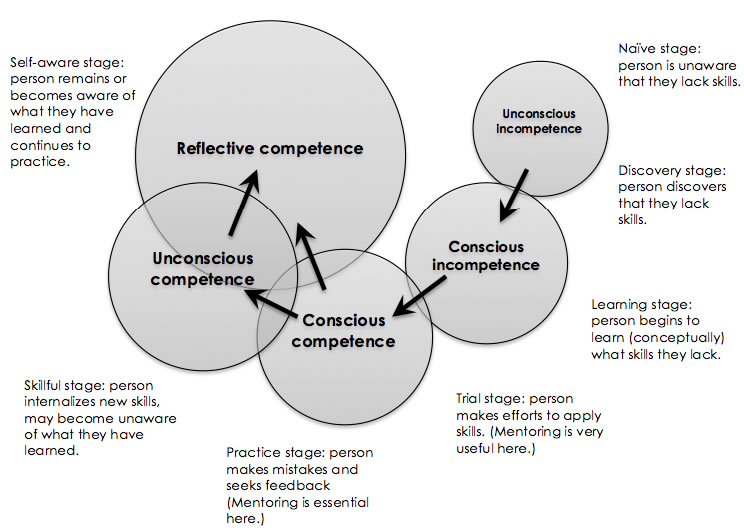In today’s business environment, organizations need to manage information, knowledge and skills very effectively in order to maintain competitive advantage. And when highly skilled individuals leave, either to accept a new opportunity, relocate, join a competitor, or to retire, they take a very valuable resource with them.
Complications
Training is one way we try to transform information into knowledge and knowledge into skills, yet it often produces less than perfect results. There are several reasons for this:
- Professional external trainers often lack specific industry or company experience, which can mean that training is rather generic and therefore it is more difficult to transfer the desired skills out of the classroom onto the job. On the other hand, instructor led training (ILT) can be very good at moving a person from the naive stage to the discovery stage and even to learning stage.
- Often an organization’s own subject matter experts (SMEs) are so experienced and skillful that they are unconsciously competent (see the model below). In other words, they do not realize (or remember) the reasons why they do the things they do. This can make it difficult for them to transfer their tacit knowledge. Also they are often not skilled in training design and so do not usually make good teachers or coaches.
- Peter Drucker argues that a skill cannot be explained in words, either spoken or written and therefore the only way to learn a skill is through apprenticeship and experience.

Challenge
How can we help get this valuable tacit knowledge transferred from our in house SMEs to the workers who need it?
Solution
Setting up internal mentoring programs is one way that companies try to preserve this valuable asset. Globalinx consultants have years of experience designing, setting up and managing successful internal mentoring programs. We can take the risk out of it and help make your program more cost effective and productive by:
Program design: Globalinx training consultants can help design mentoring programs that will achieve their objectives.
- To be effective mentoring programs should have very specific objectives. Measurable goals are the best, but when this is not possible the program will need planned milestones, fair evaluation and a clear structure with a neutral coordinator.
Train the participants: Globalinx has designed “pre-mentoring” workshops to train both mentors and mentees and thereby prepare them for entering into a productive mentoring relationship.
- Good mentoring programs prepare mentors and mentees by clarifying their roles and defining their time and energy commitments. Ideally, mentors and mentees will write down their goals for the relationship and share these with each other. They will also agree on the frequency, timing and quality of feedback that is desired from the mentor and the level of challenge and support desired by the mentee.
Monitor and control: Globalinx provides ongoing monitoring and support of the mentoring program by supplying a Mentor Program Manager (MPM) whose role is to facilitate ongoing progress review meetings of both the mentors and mentees, suggest course corrections as needed, share lessons learned from current and previous mentoring programs, and provide tools for tracking progress against objectives.
- Every few weeks, the mentors will review progress toward the agreed goals. Mentees have to feel comfortable in sharing their weaknesses with the mentors, and mentors have to be able to provide constructive feedback and support. They also need to be willing to exit a relationship that they can’t give sufficient time to or aren’t able to assist the mentee in the areas he or she needs help with. The MPM monitors the program continuously and facilitates and changes that are needed. They also act as a confidential contact person to mediate disputes.
Lessons learned: By the end of every mentoring program there should be learning in at least two areas: the original learning objectives and learning about learning. So the final responsibility of the MPM is to evaluate the program in terms of its success at achieving the original learning objectives. But it is also very useful to gather the lessons learned about learning within that particular environment (the company or organization in which the program was run). This information can be used to plan and improve future mentoring programs.


